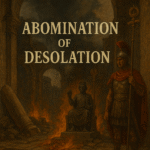Introduction – sharpening the blade
Theology is simply “reasoning about God.” Done well, it refines worship, fortifies witness, and guards the Church from error. Done poorly—or wielded pridefully—it can fracture congregations, poison public perception, and turn living faith into lifeless theory. History, Scripture, and today’s headlines all confirm that theology is a blade that cuts in both directions. This article traces the contours of that blade, showing where it brings healing and where it can draw blood.
I. How Theology Helps
1. Safeguarding the gospel from distortion
From the first-century Jerusalem Council to the fourth-century Council of Nicaea, believers have gathered to hammer out doctrine so the good news remains unpolluted. Those creeds still anchor orthodox faith and stop the drift toward fashionable heresies. thegospelcoalition.org
2. Deepening love for God and neighbor
Serious study of God’s character enlarges the soul. Surveys of seminary students show that disciplined theological reflection consistently fuels prayer, worship, and compassionate action. globaluniversity.edumorling.edu.au
3. Shaping a credible public ethic
Whether articulating just-war limits, abolitionism, or modern campaigns for racial reconciliation, thoughtful theology equips Christians to speak moral sense to a confused world. Calls for “togetherness in disagreement” are not sentimentalism; they arise from a theology of the Church as Christ’s one body. nae.orgsojo.net
4. Bridging faith and culture
Engagements between doctrine and science—think of “evolutionary theology” or discussions on AI ethics—show believers need not fear intellectual rigor. When pastors and laity alike can translate Calvin, Aquinas, and contemporary research into the vernacular, Christianity regains cultural relevance without surrendering conviction. wired.com
5. Fueling global mission and unity
Shared confessions give missionaries from Lagos to London a common language. They also keep local churches from becoming personality cults; the creed, not the celebrity pastor, is the standard. When theology functions this way, diversity becomes symphonic rather than cacophonous. desiringgod.org
II. How Theology Hurts
1. Fomenting schism and tribalism
The Fundamentalist-Modernist split of the early 1900s decimated mainline denominations and still shapes American Christianity’s echo chambers. Today, Twitter-sized dogmatic skirmishes replay the same tragedy with higher speed and lower charity. en.wikipedia.orgtabletalkmagazine.com
2. Inflating intellectual pride
Paul warned, “Knowledge puffs up, but love builds up.” Academic accolades can convince leaders they sit above correction. Congregations sense the arrogance and quietly disengage—or leave. tabletalkmagazine.com
3. Weaponizing doctrine for power
When systematic frameworks become cudgels to win political turf wars, the gospel sounds like partisan propaganda. Even respected seminaries admit the temptation to baptize ideologies rather than critique them. newyorker.com
4. Paralyzing discipleship with complexity
Laypeople drowning in Greek participles often conclude that “real” faith is only for specialists. In reaction, some churches jettison doctrine altogether—swapping one ditch for another.
5. Obscuring the person of Christ
When minutiae eclipse Messiah, theology becomes the Pharisees’ millstone rather than the Emmaus road. Any system that cannot be preached to a first-generation believer on the mission field needs pruning.
III. Walking the Narrow Ridge—A Practical Way Forward
- Keep Christ at the center. Every doctrine must finally serve doxology and discipleship, not mere debate.
- Pursue “confessional humility.” Hold core convictions tightly and secondary opinions loosely. Learn to say, “I might be wrong—let’s search the Scriptures together.”
- Marry classroom with community. Rotate theologians’ round-tables with food-bank Saturdays. Orthodoxy without orthopraxy soon sours.
- Cultivate cross-tradition friendships. Read beyond your tribe. Anglican liturgy can refresh a Pentecostal heart; a Baptist hymn may soften a Reformed mind.
- Translate, don’t truncate. Explain atonement theories in plain English; show how Trinitarian debates affect Monday’s work ethic and Wednesday’s grief counseling.
Conclusion – wielding the blade wisely
Theology is inevitable. The question is not whether Christians will theologize, but how. Handled reverently, it sharpens mission, guards truth, and draws the skeptic into meaningful dialogue. Mishandled, it carves the body of Christ into quarrelsome fragments and leaves a watching world unconvinced. The Church must therefore treat theology like a sword forged for service: honor its edge, respect its dangers, and always aim it at the real enemy—falsehood and injustice, never at fellow soldiers. When we do, the blade becomes a plowshare, turning hard soil and planting seeds for a harvest that will endure.
Works Cited (Chicago 17th Edition)
- Augustine. The City of God. Translated by Marcus Dods. Modern Library Classics. New York: Random House, 1993. amazon.com
- Britannica, The Editors of Encyclopaedia. “First Council of Nicaea.” Encyclopaedia Britannica. Last modified 2025. Accessed June 6 2025. britannica.com
- Bruce, F. F. The Book of the Acts. Rev. ed. New International Commentary on the New Testament. Grand Rapids: Eerdmans, 1988. eerdmans.com
- González, Justo L. The Story of Christianity, Vol. 1: The Early Church to the Dawn of the Reformation. 2nd ed. San Francisco: HarperOne, 2010. amazon.com
- Jenkins, Philip. The Next Christendom: The Coming of Global Christianity. 3rd ed. New York: Oxford University Press, 2011. global.oup.com
- Marsden, George M. Fundamentalism and American Culture. New ed. New York: Oxford University Press, 2022. global.oup.com
- McGrath, Alister E., and Matthew J. Thomas. Christian Theology: An Introduction. 7th ed. Hoboken, NJ: Wiley-Blackwell, 2024. wiley.com
- Noll, Mark A. The Scandal of the Evangelical Mind. Grand Rapids: Eerdmans, 1995. amazon.com
- Stassen, Glen H., and David P. Gushee. Kingdom Ethics: Following Jesus in Contemporary Context. 2nd ed. Grand Rapids: Eerdmans, 2016. eerdmans.com
- Volf, Miroslav. Exclusion and Embrace: A Theological Exploration of Identity, Otherness, and Reconciliation. Nashville: Abingdon Press, 1996. amazon.com
- Yoder, John Howard. The Politics of Jesus. 2nd ed. Grand Rapids: Eerdmans, 1994. eerdmans.com



